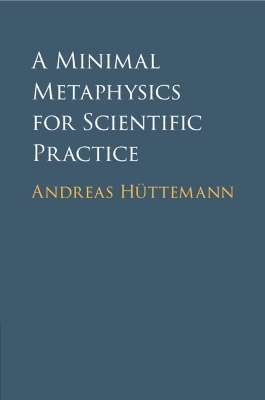
A Minimal Metaphysics for Scientific Practice
Seiten
2023
Cambridge University Press (Verlag)
978-1-009-01043-6 (ISBN)
Cambridge University Press (Verlag)
978-1-009-01043-6 (ISBN)
This book provides a minimal metaphysics for scientific practice, i.e. one that refrains from postulating any structure that is explanatorily irrelevant. Hüttemann analyses central aspects of scientific practice, such as prediction, explanation and manipulation, to consider whether and (if so) what presuppositions best account for these practices.
What are the metaphysical commitments which best 'make sense' of our scientific practice (rather than our scientific theories)? In this book, Andreas Hüttemann provides a minimal metaphysics for scientific practice, i.e. a metaphysics that refrains from postulating any structure that is explanatorily irrelevant. Hüttemann closely analyses paradigmatic aspects of scientific practice, such as prediction, explanation and manipulation, to consider the questions whether and (if so) what metaphysical presuppositions best account for these practices. He looks at the role which scientific generalisation (laws of nature) play in predicting, testing, and explaining the behaviour of systems. He also develops a theory of causation in terms of quasi-inertial processes and interfering factors, and he proposes an account of reductive practices that makes minimal metaphysical assumptions. His book will be valuable for scholars and advanced students working in both philosophy of science and metaphysics.
What are the metaphysical commitments which best 'make sense' of our scientific practice (rather than our scientific theories)? In this book, Andreas Hüttemann provides a minimal metaphysics for scientific practice, i.e. a metaphysics that refrains from postulating any structure that is explanatorily irrelevant. Hüttemann closely analyses paradigmatic aspects of scientific practice, such as prediction, explanation and manipulation, to consider the questions whether and (if so) what metaphysical presuppositions best account for these practices. He looks at the role which scientific generalisation (laws of nature) play in predicting, testing, and explaining the behaviour of systems. He also develops a theory of causation in terms of quasi-inertial processes and interfering factors, and he proposes an account of reductive practices that makes minimal metaphysical assumptions. His book will be valuable for scholars and advanced students working in both philosophy of science and metaphysics.
Andreas Hüttemann is Professor of Theoretical Philosophy at the University of Cologne. He is the author of What's Wrong with Microphysicalism? (2004) and Ursachen (2013), and has published many book chapters and journal articles on metaphysics, philosophy of science and early modern philosophy.
Introduction; 1. Laws of nature and their modal surface structure; 2. The problem of ceteris paribus clauses; 3. Causation – conceptual groundwork; 4. Causation – application and augmentation; 5. Reductive practices; 6. Reduction and physical foundationalism; 7. Reduction and ontological monism; 8. Concluding remarks: methods and epistemic sources in metaphysics.
| Erscheinungsdatum | 15.08.2023 |
|---|---|
| Zusatzinfo | Worked examples or Exercises |
| Verlagsort | Cambridge |
| Sprache | englisch |
| Themenwelt | Geisteswissenschaften ► Philosophie ► Erkenntnistheorie / Wissenschaftstheorie |
| Geisteswissenschaften ► Philosophie ► Metaphysik / Ontologie | |
| Naturwissenschaften | |
| ISBN-10 | 1-009-01043-3 / 1009010433 |
| ISBN-13 | 978-1-009-01043-6 / 9781009010436 |
| Zustand | Neuware |
| Haben Sie eine Frage zum Produkt? |
Mehr entdecken
aus dem Bereich
aus dem Bereich
die Grundlegung der modernen Philosophie
Buch | Softcover (2023)
C.H.Beck (Verlag)
CHF 25,20
Buch | Softcover (2023)
Reclam, Philipp (Verlag)
CHF 9,80


![Was heißt Denken?. Vorlesung Wintersemester 1951/52. [Was bedeutet das alles?] - Martin Heidegger](/media/113619842)